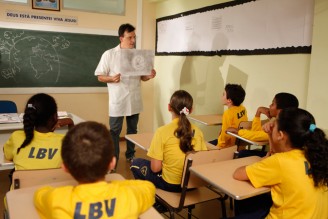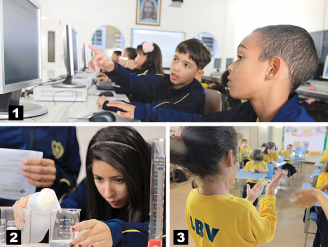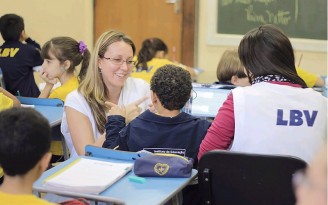
“Know how to say ‘No’ to drugs,” say LBV students
Jéssica Botelho
Wednesday | August 05, 2015 | 5:46 PM | Last update: September 22, 2016, 4:07 PM (Brasilia time)
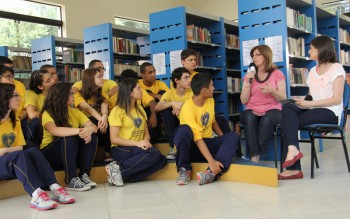
According to a recent report by the World Health Organization (WHO), more than 3 million people died from using alcohol in 2012, for reasons ranging from cancer to violence. The document highlights that the American and European regions recorded the highest rates of consumption among adolescents (between 15 and 19). Also according to the organization, dependence on tobacco and alcohol together account for 8.1 percent of the world’s health problems.
+ Read the article “Parents and children against drugs” by educator Paiva Netto
Mindful of these statistics, the Legion of Good Will (LBV) is constantly organizing lessons and activities in its schools, especially directed to young people, in order to help change the current situation concerning drugs. The topic is discussed more thoroughly in the “Convivência” [Living Together] classes*1 by the students themselves, who carry out research and bring information, reports, and scientific data for debate. The result of the discussion leads to producing materials such as slogans, videos, cartoons, and advertising pieces that raise awareness about the subject to other young people.
To awaken this leadership in young people is so important for the LBV that it makes facilities available, like the Super Good Will Communications Network*2, so they can divulge the results of their work. One of these opportunities was the recording of a TV program with 12th grade high school students from the José de Paiva Netto Educational Institute in São Paulo (Brazil). On the occasion, Letícia Lopes, 17, said that, “Information on drugs is the most alarming. Nowadays, even children are being admitted to hospitals because of alcohol abuse. That’s absurd!”
Exclusion, depression, withdrawal from family, and entering the world of criminality were just some of the consequences of chemical dependency indicated by a research conducted in class. Student Pedro Furtado, 17, believes that, “The problems caused by drugs are much greater than we imagine. What we manage to see in terms of physical problems, for example, is just the tip of the iceberg. Both legal and illegal drugs cause psychological, social, family, and spiritual problems.”
“It’s important to stress the disclosure of such a serious issue on both social networks and the media, which plays a key role as an opinion former. This is not just up to us, the State must also invest in the social foundation, which is Education, so that people don’t get into these vices, because in most cases it begins in schools where it’s not safe,” says Michael William, 17.
For Eric Fiedler, 18, inquiring and using critical thinking are fundamental before taking any attitude. “Is it worth taking drugs and putting an end to our entire life because of such a short period like adolescence?” he ponders.
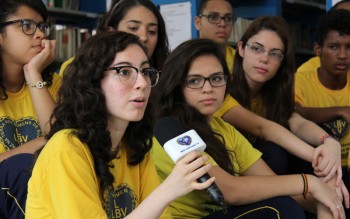
“Know how to say ‘No’! Don’t be afraid to say ‘No’. That’s essential, simple, and effective,” advises Rafael Pacheco, 18. And Letícia adds, “All young people have dreams and drugs just destroy these dreams. There are so many things to try in life that are so much better than drugs!” Diego Lemos, 17, reports his own experience, “I can say categorically that I have childhood friends who are involved with the world of drugs today. I don’t regret not having gone with them, because I knew that wouldn’t do me any good. If I hadn’t had the support from the school, my destiny would have been different.”
With regard to this topic dealt with by the students, the principal of the Good Will Educational Complex, Suelí Periotto, who is currently pursuing a Doctorate degree in Education from PUC-SP, said that, “Young people often give in to their conscience and accept drugs because they’re not spiritually strong in their convictions and in their well-being, which needs to be constantly preserved. When we begin to feed them inwardly, their intellectual knowledge is more enlightened and expanded.”
In his article “Combating drugs and alcoholism,” the President of the LBV, educator Paiva Netto, writes, “It is at an early age that we learn how destructive drugs and alcohol are. The lamentable consequences leap in front of our eyes. Look at how many road traffic victims, the unhappiness in the bosom of households, and the high costs it imposes on healthcare systems. . . . Initiatives aimed at treating humanely those who have fallen into these traps of addiction or which focus on preventing such ills deserve all our support and incentives. Combating what is bad for people is also an act of legitimate charity.”
The José de Paiva Netto Educational Institute is located at Av. Rudge, 700 – Bom Retiro, São Paulo (Brazil). For further information, please write to english@boavontade.com.
________________________________
*1 Living Together classes — The Living Together subject, which was created by educator Paiva Netto, invites students to take part in research activities and discuss the important issues of daily life. It is part of the school curriculum of the Legion of Good Will’s teaching network throughout the world.
*2 Super Good Will Communications Network — The term refers to the vehicles of communication 100% Jesus, whose purpose is to propagate the fraternal ideals of Ecumenism without restrictions: Super Good Will Radio Network, Boa Vontade TV (channel 20 on SKY cable TV), Rede Educação e Futuro de Televisão – Reeducar [Education and Future Television Network – Re-educate], Good Will Portal, and publications of Ecumenical Spirituality.
